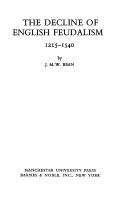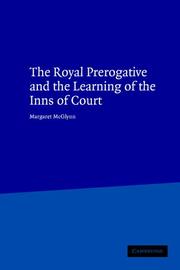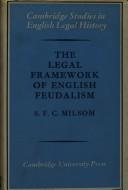| Listing 1 - 10 of 19 | << page >> |
Sort by
|
Book
Abstract | Keywords | Export | Availability | Bookmark
 Loading...
Loading...Choose an application
- Reference Manager
- EndNote
- RefWorks (Direct export to RefWorks)
Justice --- Droit féodal --- Administration
Book
ISBN: 9782406078364 9782406078371 2406078361 Year: 2018 Publisher: Paris : Classiques Garnier,
Abstract | Keywords | Export | Availability | Bookmark
 Loading...
Loading...Choose an application
- Reference Manager
- EndNote
- RefWorks (Direct export to RefWorks)
Droit féodal --- Feudal law --- Congresses --- Law --- Law, Medieval --- Sources --- Jerusalem --- History --- Droit féodal --- Congresses. --- Droit féodal. --- Droit féodal.
Multi
ISBN: 9783447102179 3447102179 Year: 2014 Volume: 68 Publisher: Wiesbaden: Harrossowitz,
Abstract | Keywords | Export | Availability | Bookmark
 Loading...
Loading...Choose an application
- Reference Manager
- EndNote
- RefWorks (Direct export to RefWorks)
Feudal law --- Droit féodal --- Sachsenspiegel --- Law, Germanic --- Jurisprudence --- Law, Medieval. --- Roman influences. --- Sachsenspiegel. --- Droit féodal
Book
ISBN: 9782717859188 2717859187 Year: 2010 Publisher: Paris: Economica,
Abstract | Keywords | Export | Availability | Bookmark
 Loading...
Loading...Choose an application
- Reference Manager
- EndNote
- RefWorks (Direct export to RefWorks)
Cette Histoire du droit et des institutions de la France médiévale et moderne vise à décrire, en quatre temps, comment s'est lentement construit le système juridique et institutionnel français. Droit et institutions s’y croisent en permanence pour montrer que la lente redécouverte du legs politique et juridique romain dans un Occident médiéval déstabilisé au lendemain des invasions, a largement servi la renaissance de l’État. Mais il serait faux d'en rester à cette image stéréotypée d'un modèle institutionnel imposé par la romanité, tant les traditions germaniques, la pratique ecclésiale, l'apport du droit féodal, l'action des princes et des rois, tout comme la force de persuasion de leurs conseillers et de leurs légistes, ont admirablement contribué à façonner l’État royal. Un État constamment construit sur les droits et le Droit, autour d'un maillage d'institutions aux facettes perpétuellement mouvantes et toujours plus finement ciselées par les orfèvres du politique.
Droit --- Institutions politiques --- Histoire --- Droit féodal --- Droit canonique --- Justice --- Administration --- Histoire. --- France --- Droit féodal
Book
ISBN: 9783406632358 3406632351 Year: 2012 Publisher: München: Beck,
Abstract | Keywords | Export | Availability | Bookmark
 Loading...
Loading...Choose an application
- Reference Manager
- EndNote
- RefWorks (Direct export to RefWorks)
Féodalité --- Droit féodal --- Feudalism --- Féodalité. --- Droit féodal. --- Féodalité. --- Droit féodal.
Book
ISBN: 9788868590772 8868590778 Year: 2016 Publisher: Leonforte : Euno Edizioni,
Abstract | Keywords | Export | Availability | Bookmark
 Loading...
Loading...Choose an application
- Reference Manager
- EndNote
- RefWorks (Direct export to RefWorks)
Droit --- Droit féodal. --- Règle de droit. --- Socialisation juridique. --- Histoire --- Droit féodal. --- Règle de droit.
Book
ISBN: 9004529179 9004504540 Year: 2023 Publisher: Boston : BRILL,
Abstract | Keywords | Export | Availability | Bookmark
 Loading...
Loading...Choose an application
- Reference Manager
- EndNote
- RefWorks (Direct export to RefWorks)
This book offers an English translation, a working Latin text, and an up-do-date historical and historiographical overview of the Libri Feudorum, the earliest known collection of feudal law lying at the core of current debates on feudalism.
Feudal law --- Libri feudorum. --- Droit féodal --- Feudalism --- Law, Feudal --- Land tenure --- Law --- Law and legislation --- Feudorum consuetudines --- Consuetudines feudorum --- Decima collatio

ISBN: 071900294X Year: 1968 Publisher: Manchester : New York : Manchester U.P ; Barnes & Noble,
Abstract | Keywords | Export | Availability | Bookmark
 Loading...
Loading...Choose an application
- Reference Manager
- EndNote
- RefWorks (Direct export to RefWorks)
Feudal law --- Feudalism --- Féodalité --- -Feudalism --- -Law, Medieval --- Medieval law --- Feudal tenure --- Civilization, Medieval --- Land tenure --- Land use --- Land use, Rural --- Chivalry --- Estates (Social orders) --- Droit féodal --- Law, Feudal --- Law --- Law and legislation --- Law, Medieval. --- Féodalité --- Law, Medieval

ISBN: 0521804299 0521187699 1107131006 0511179987 0511063709 0511306865 0511495420 1280419075 0511203969 0511072163 9780511063701 9780511179983 9780511072161 9780511495427 9780521804295 9780521187695 Year: 2003 Publisher: Cambridge, UK ; New York : Cambridge University Press,
Abstract | Keywords | Export | Availability | Bookmark
 Loading...
Loading...Choose an application
- Reference Manager
- EndNote
- RefWorks (Direct export to RefWorks)
Between the mid-fifteenth and mid-sixteenth century Prerogativa Regis, a central text of fiscal feudalism, was introduced into the curriculum of the Inns of Court, developed, and then abandoned. This 2003 book argues that while lawyers often turned their attention to the text when political and financial issues brought it to the fore, they sought to maintain an intellectual consistency and coherence in the law. Discussions of both substance and procedure demonstrate how readers reflected the concerns of their time in the topics they chose to consider and how they drew on the learning of both their predecessors and their peers at the Inns. The first study based primarily on readings, this book threw light on legal education, early Tudor financial and administrative procedure, and the relationship between the ways that law was made, taught and used.
Prerogative, Royal --- Feudal law --- Inns of Court --- History --- Royal prerogative --- Court, Inns of --- Droit féodal --- Feudalism --- Law, Feudal --- Law --- Executive power --- Monarchy --- Divine right of kings --- Regalia --- Bar associations --- Land tenure --- Law and legislation --- General and Others --- Inns of Court. --- History. --- Inns of Court School of Law

ISBN: 0521209471 0521082838 1139085204 0511561245 9780521209472 9780511561245 9780521082839 Year: 1976 Publisher: Cambridge: Cambridge university press,
Abstract | Keywords | Export | Availability | Bookmark
 Loading...
Loading...Choose an application
- Reference Manager
- EndNote
- RefWorks (Direct export to RefWorks)
Professor Milsom works out a fresh view of the beginnings of the common law concerning land. The received picture depends upon progressive assumptions: key words began with their later meanings; the law began with abstract ideas of property; a tenant's title to his tenement was never subject to his lord's control; the lord had no discretion, only the power to decide disputes according to external criteria; jurisdiction in that sense was all the lord lost as royal remedies developed; and all the tenant gained was better protection of unaltered rights. It is a picture of procedural changes taking place against an unchanging background, with the feudal structure at the beginning almost as insubstantial as it was to be at the end.
History of the law --- Great Britain --- Feudal law --- Droit féodal --- Law, Feudal --- Land tenure --- 34 <09> --- 34 <09> Rechtsgeschiedenis --(algemeen) --- Rechtsgeschiedenis --(algemeen) --- Feudalism --- Law and legislation --- Law --- Arts and Humanities --- History --- Land tenure - Law and legislation - Great Britain --- Feudal law - Great Britain --- Real property
| Listing 1 - 10 of 19 | << page >> |
Sort by
|

 Search
Search Feedback
Feedback About UniCat
About UniCat  Help
Help News
News